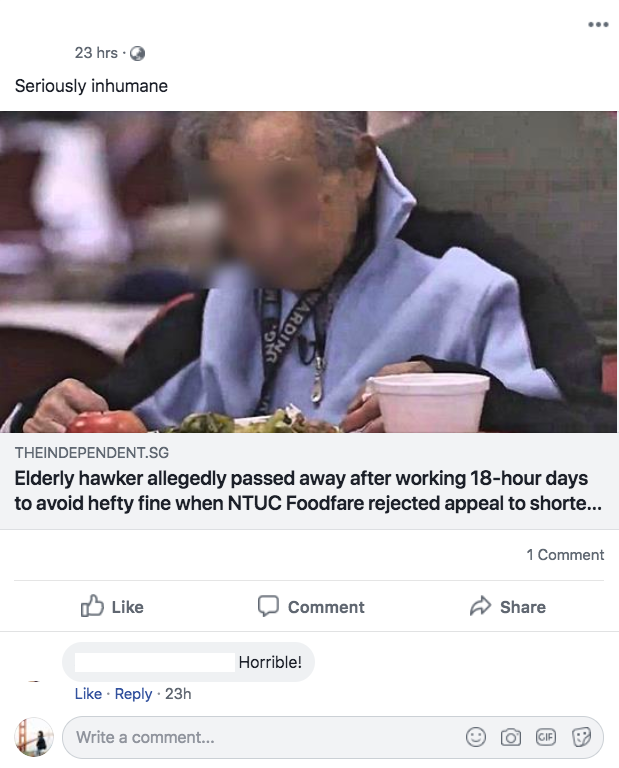The Independent SG recently published an article about an elderly hawker with NTUC Foodfare who allegedly passed away from working 18-hour days to avoid a hefty fine from NTUC Foodfare. On the same day, the website also published another article about an elderly, injured hawker who was slapped with a $3,500 fine for being unable to operate for a few days.
Eventually, NTUC Foodfare stepped forward to claim the articles had been fabricated. In turn, The Independent reiterated that they were “[standing up] for the little guy”, and that “walking away by not addressing the plight of our hawkers is a disservice to our society”.
The David versus Goliath optics were all it took for outrage to spread like wildfire. Netizens lambasted the government through unrestrained rhetoric, all supposedly in support of the hawker they believed had no voice.
But after reading a litany of strongly-worded comments from those who shared the article in question, it’s hard to tell if the excessive anger from Singaporeans translates into genuine support for hawkers. After all, a recent Talking Point episode revealed that Singaporeans are still reluctant to pay more for hawker food, even if it may be the most effective solution in the short term to preserve our hawker culture.
This is what we need to understand: outrage that serves to make us feel good about ourselves for championing the disenfranchised is simply noise, nothing more.

And this is problematic because algorithms love anger. In this age of attention, anything that gets clicks gets pushed to the top of the newsfeed.
According to sociologist Zeynep Tufekci, there is more information online than anyone could ever consume, so one of the most straightforward ways to grab someone’s attention is to get them outraged.
Similarly, political scientist Hans Noel states that “there is evidence that shows that the most negative, the most extreme, the most attention-getting tweets or posts will get the most retweets or likes and so will get the most attention”.
He adds, “If the media environment favours outrage, then most observers will be exposed to outrage, and on balance most will accept it.”
After the two articles were published, many commenters were intent on vilifying the multi-million dollar profit-making corporation or Singapore’s supposedly authoritarian government. They were angry enough to express, “VOTE THEM OUT”, but not enough to suggest concrete, sustainable solutions along with their emotion.
This is where we see how, when self-importance creeps in, justice becomes more about validating our anger within our echo chambers than actually working with the authorities to find substantial answers to real problems.
Similar to poverty porn, the basic drive for this brand of sympathetic outrage is self-serving at best, counterproductive at worst.
Outrage is often based off simplistic, one-dimensional representations of a situation. This transforms a complex human experience into a seemingly understandable issue; something that appears easily treatable by fixing a singular cause of the problem.
In this case, it is suggested that the suffering of hawkers stems solely from NTUC’s flawed social enterprise model and the management’s inability to admit their mistakes. We also inadvertently assume the unfair treatment of hawkers is simply because of laborious, stipulated working hours, or the exorbitant rent.
Though well-intentioned, most of this outrage is driven by mere emotion. Logically speaking, a customer’s willingness to spend has a direct impact on our hawker culture. We cannot be absolved of any blame for the hawker’s plight.
In addition, outrage from ordinary citizens almost always drowns out the voices of hawkers themselves.
Without being hawkers, many of us are not directly disadvantaged by the situation. We can comfortably participate in the fervent debate and feel satisfied that we care passionately about our hawkers, all while never having to experience the same systemic injustice we want to eradicate.
This sense of injustice comes from a good place, but it remains uninvolved.
If we truly believe in fighting for our hawkers, we must understand how empty, heightened outrage unwittingly excludes them from the conversation. Not only does this outrage not solve any of their day-to-day issues, it also directs attention away from their predicament, and focuses instead on “public backlash”.

Consider the recent fight to repeal 377A. The online furore started necessary conversations about our social progressiveness. Even though the status quo remains for now, many who neglected the topic previously might have become more aware about the necessity of being politically engaged.
But for outrage to be optimal, it must be critical and controlled, lest we push away the exact people we need to engage to enact change for the people we claim to champion.
In this case, the ones we need on our side are policymakers, the government, and NTUC.
We know that our government and their affiliated corporations usually practise uncompromising pragmatism. In most matters, well-researched data and level-headed arguments override emotion.
In order to win their game, we have to play by their rules. We have to get organised, not outraged.
It would be more productive to channel our anger into action that makes a difference, such as planning and structuring sound implementations to policy that we may raise to our MPs. Other solutions include writing in to public forums, educating friends and family, and continuing to support our favourite hawkers even when they increase their prices.
Alternatively, we can start our own initiatives that provide tangible assistance to hawkers for the time being, such as helping them to translate legal contracts into simplified dialect or their mother tongue.
We should also take a long and hard look at the average consumer’s place in hawker culture. This starts with addressing our attitudes towards food consumerism, and adjusting our willingness to pay more for hawker food to keep the culture alive.
At the same time, we must demand more progressive policies from the government and NTUC; policies that reflect an open-mindedness towards elevating and preserving our precious hawker culture. We can claim hawker culture as ‘intangible heritage’ all we want, but our policies must first treat the individual hawker as a human being, not a statistic.
This means fundamentally understanding that hawkers are business owners. They possess legitimate authority on how a business should be run, and their views should guide policies that will affect their livelihood.

In their quest to “put the pen back in the hands of the journalist”, their seemingly progressive politics are merely the flip side of the same coin as authoritarianism. They don’t get to play the hero who comes in to save the underdog when NTUC Foodfare and the government weren’t roped into the conversation.
The only way to demonstrate the cogency of one’s arguments is by putting it up against directly opposing views. In this case, their ‘progressive’ politics stopped being progressive the moment it became just as single-minded as the side they opposed.
As the viral articles have proven, news that’s meant to elicit outrage poses a dire threat to effective and informed citizenship. It doesn’t just render our outrage futile; it potentially makes things worse for hawkers when the government chooses to double down on their regulations to prove a point (as they have often done).
Before we let blind sympathy influence our understanding of reality, there’s one thing we must remember: outrage is all about the fight, never the cause.






